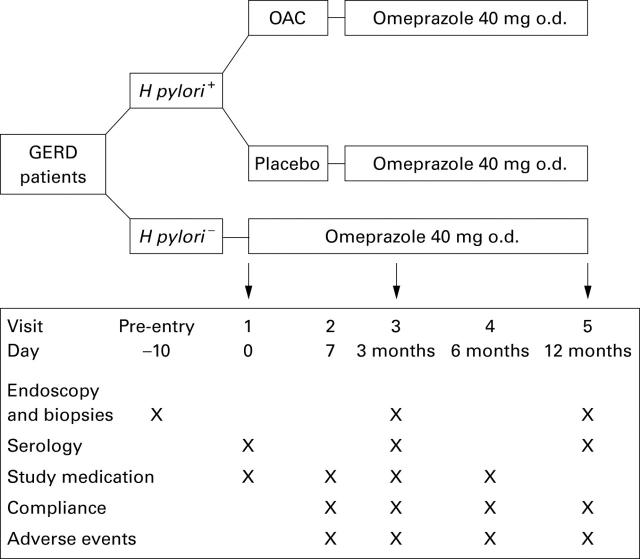Abstract
BACKGROUND—We have previously observed that profound acid suppressive therapy in Helicobacter pylori positive patients with gastro-oesophageal reflux disease is associated with increased corpus inflammation and accelerated development of atrophic gastritis. AIM—To investigate if H pylori eradication at the start of acid suppressive therapy prevents the development of these histological changes. PATIENTS/METHODS—In a prospective randomised case control study, patients with reflux oesophagitis were treated with omeprazole 40 mg once daily for 12 months. H pylori positive patients were randomised to additional double blind treatment with omeprazole 20 mg, amoxicillin 1000 mg and clarithromycin 500 mg twice daily or placebo for one week. Biopsy sampling for histology, scored according to the updated Sydney classification, and culture were performed at baseline, and at three and 12 months. RESULTS—In the persistently H pylori positive group (n=24), active inflammation increased in the corpus and decreased in the antrum during therapy (p=0.032 and p=0.002, respectively). In contrast, in the H pylori positive group that became H pylori negative as a result of treatment (n=33), active and chronic inflammation in both the corpus and antrum decreased (p⩽0.0001). The decrease in active and chronic inflammation in the corpus differed significantly compared with the persistently H pylori positive group (both p=0.001). For atrophy scores, no significant differences were observed between H pylori eradicated and persistently H pylori positive patients within one year of follow up. No changes were observed in the H pylori negative control group (n=26). CONCLUSIONS—H pylori eradication prevents the increase in corpus gastritis associated with profound acid suppressive therapy. Longer follow up is needed to determine if H pylori eradication prevents the development of atrophic gastritis. Keywords: Helicobacter pylori; gastritis; omeprazole; atropy; gastro-oesophageal reflux disease
Full Text
The Full Text of this article is available as a PDF (208.5 KB).
Figure 1 .
Study algorithm. Arrows indicate time schedule for endoscopy. O.d., once daily
Figure 2 .
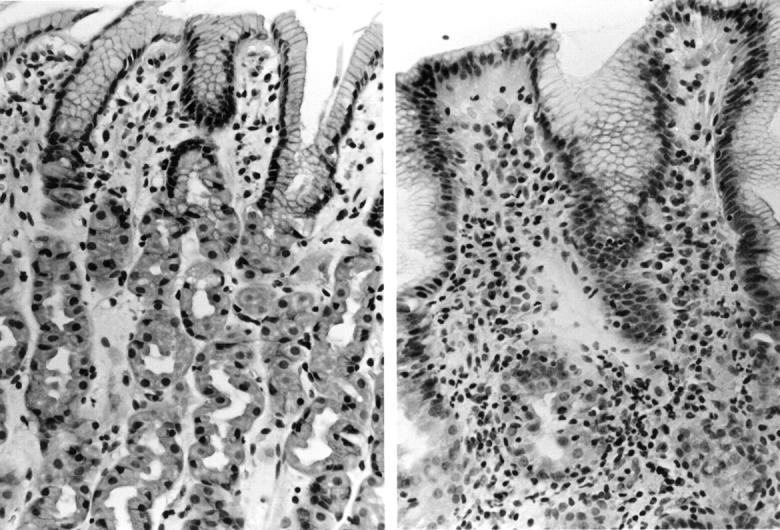
Corpus biopsy specimens of a persistently H pylori infected patient before (left) and after 12 months (right) of omeprazole treatment. Superficial gastritis (left) changes to more profound invasive, active, and chronic inflammation in the complete glandular layer.
Figure 3 .
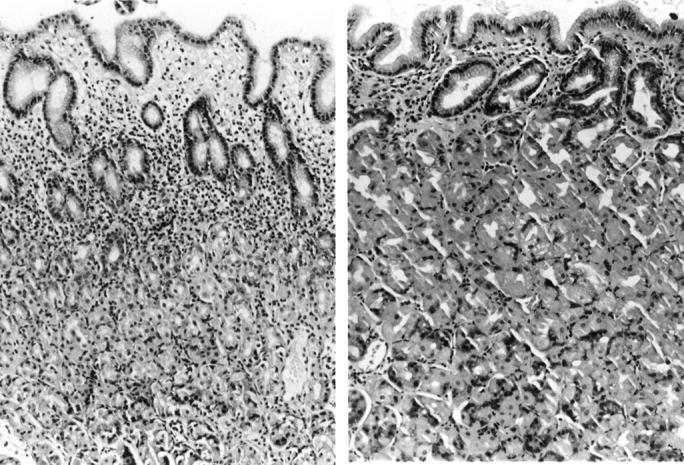
Corpus biopsy specimens of a successfully H pylori eradicated patient before (left) and after 12 months (right) of omeprazole treatment. The superficial inflammation at baseline (left) regresses during PPI treatment.
Figure 4 .
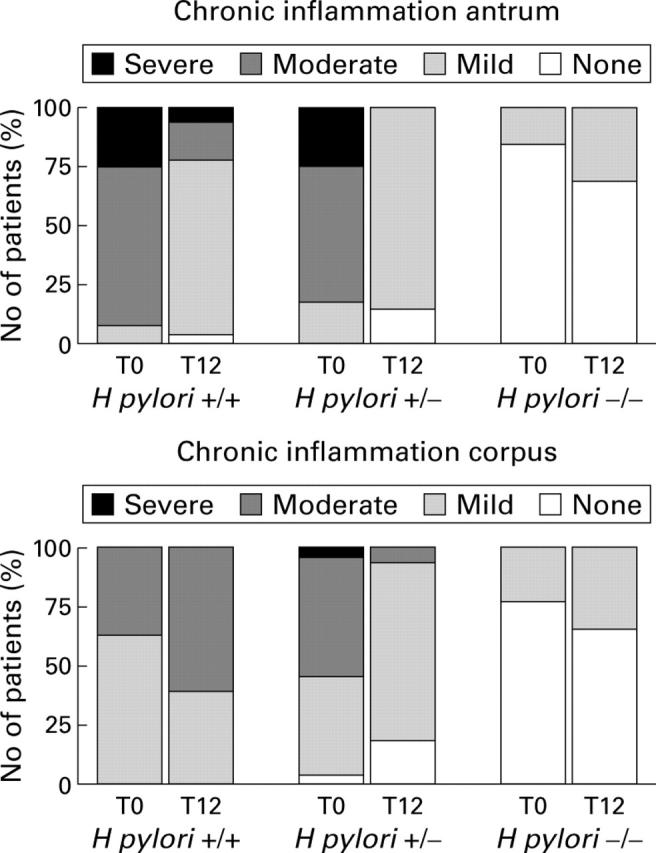
Changes in chronic inflammation parameters for the antrum and corpus at baseline (T0) and at follow up (T12) in persistently positive H pylori patients (+/+), in patients who became H pylori negative as a result of treatment (+/−), and in persistently negative controls (−/−). Antrum biopsy specimens showed decreased chronic inflammation for H pylori+/+ and H pylori+/−. Chronic corpus inflammation improved in eradicated patients (+/−) whereas in H pylori+/+ patients inflammation increased during omeprazole treatment.
Figure 5 .
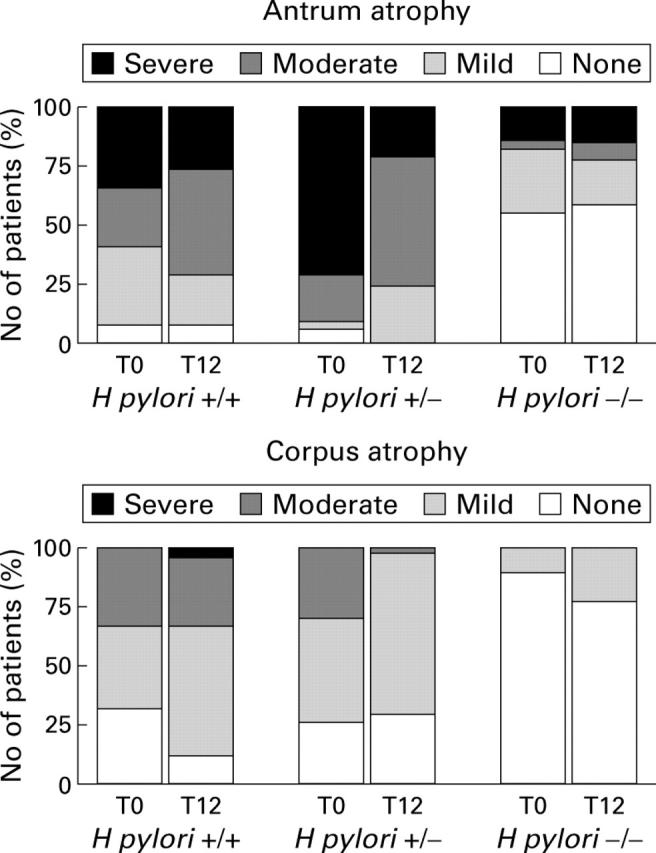
Changes in atrophy parameters for the antrum and corpus at baseline (T0) and at follow up (T12) in the persistently positive H pylori patients (+/+), in patients who became H pylori negative as a result of treatment (+/−), and in persistently negative controls (−/−). Atrophy decreased in the antrum of H pylori+/− patients only (table 3). There were no changes in corpus atropy after one year of follow up.
Selected References
These references are in PubMed. This may not be the complete list of references from this article.
- Berstad A. E., Hatlebakk J. G., Maartmann-Moe H., Berstad A., Brandtzaeg P. Helicobacter pylori gastritis and epithelial cell proliferation in patients with reflux oesophagitis after treatment with lansoprazole. Gut. 1997 Dec;41(6):740–747. doi: 10.1136/gut.41.6.740. [DOI] [PMC free article] [PubMed] [Google Scholar]
- Blaser M. J., Perez-Perez G. I., Kleanthous H., Cover T. L., Peek R. M., Chyou P. H., Stemmermann G. N., Nomura A. Infection with Helicobacter pylori strains possessing cagA is associated with an increased risk of developing adenocarcinoma of the stomach. Cancer Res. 1995 May 15;55(10):2111–2115. [PubMed] [Google Scholar]
- Correa P. Human gastric carcinogenesis: a multistep and multifactorial process--First American Cancer Society Award Lecture on Cancer Epidemiology and Prevention. Cancer Res. 1992 Dec 15;52(24):6735–6740. [PubMed] [Google Scholar]
- Dixon M. F., Genta R. M., Yardley J. H., Correa P. Classification and grading of gastritis. The updated Sydney System. International Workshop on the Histopathology of Gastritis, Houston 1994. Am J Surg Pathol. 1996 Oct;20(10):1161–1181. doi: 10.1097/00000478-199610000-00001. [DOI] [PubMed] [Google Scholar]
- Dixon M. F. Helicobacter pylori and peptic ulceration: histopathological aspects. J Gastroenterol Hepatol. 1991 Mar-Apr;6(2):125–130. doi: 10.1111/j.1440-1746.1991.tb01451.x. [DOI] [PubMed] [Google Scholar]
- Eissele R., Brunner G., Simon B., Solcia E., Arnold R. Gastric mucosa during treatment with lansoprazole: Helicobacter pylori is a risk factor for argyrophil cell hyperplasia. Gastroenterology. 1997 Mar;112(3):707–717. doi: 10.1053/gast.1997.v112.pm9041231. [DOI] [PubMed] [Google Scholar]
- Genta R. M. Acid suppression and gastric atrophy: sifting fact from fiction. Gut. 1998 Jul;43 (Suppl 1):S35–S38. doi: 10.1136/gut.43.2008.s35. [DOI] [PMC free article] [PubMed] [Google Scholar]
- Kuipers E. J., Lee A., Klinkenberg-Knol E. C., Meuwissen S. G. Review article: the development of atrophic gastritis--Helicobacter pylori and the effects of acid suppressive therapy. Aliment Pharmacol Ther. 1995 Aug;9(4):331–340. doi: 10.1111/j.1365-2036.1995.tb00391.x. [DOI] [PubMed] [Google Scholar]
- Kuipers E. J., Lundell L., Klinkenberg-Knol E. C., Havu N., Festen H. P., Liedman B., Lamers C. B., Jansen J. B., Dalenback J., Snel P. Atrophic gastritis and Helicobacter pylori infection in patients with reflux esophagitis treated with omeprazole or fundoplication. N Engl J Med. 1996 Apr 18;334(16):1018–1022. doi: 10.1056/NEJM199604183341603. [DOI] [PubMed] [Google Scholar]
- Kuipers E. J., Pérez-Pérez G. I., Meuwissen S. G., Blaser M. J. Helicobacter pylori and atrophic gastritis: importance of the cagA status. J Natl Cancer Inst. 1995 Dec 6;87(23):1777–1780. doi: 10.1093/jnci/87.23.1777. [DOI] [PubMed] [Google Scholar]
- Kuipers E. J., Uyterlinde A. M., Peña A. S., Hazenberg H. J., Bloemena E., Lindeman J., Klinkenberg-Knol E. C., Meuwissen S. G. Increase of Helicobacter pylori-associated corpus gastritis during acid suppressive therapy: implications for long-term safety. Am J Gastroenterol. 1995 Sep;90(9):1401–1406. [PubMed] [Google Scholar]
- Kuipers E. J., Uyterlinde A. M., Peña A. S., Roosendaal R., Pals G., Nelis G. F., Festen H. P., Meuwissen S. G. Long-term sequelae of Helicobacter pylori gastritis. Lancet. 1995 Jun 17;345(8964):1525–1528. doi: 10.1016/s0140-6736(95)91084-0. [DOI] [PubMed] [Google Scholar]
- Lamberts R., Creutzfeldt W., Strüber H. G., Brunner G., Solcia E. Long-term omeprazole therapy in peptic ulcer disease: gastrin, endocrine cell growth, and gastritis. Gastroenterology. 1993 May;104(5):1356–1370. doi: 10.1016/0016-5085(93)90344-c. [DOI] [PubMed] [Google Scholar]
- Lind T., Veldhuyzen van Zanten S., Unge P., Spiller R., Bayerdörffer E., O'Morain C., Bardhan K. D., Bradette M., Chiba N., Wrangstadh M. Eradication of Helicobacter pylori using one-week triple therapies combining omeprazole with two antimicrobials: the MACH I Study. Helicobacter. 1996 Sep;1(3):138–144. doi: 10.1111/j.1523-5378.1996.tb00027.x. [DOI] [PubMed] [Google Scholar]
- Logan R. P., Walker M. M., Misiewicz J. J., Gummett P. A., Karim Q. N., Baron J. H. Changes in the intragastric distribution of Helicobacter pylori during treatment with omeprazole. Gut. 1995 Jan;36(1):12–16. doi: 10.1136/gut.36.1.12. [DOI] [PMC free article] [PubMed] [Google Scholar]
- Lundell L., Miettinen P., Myrvold H. E., Pedersen S. A., Thor K., Andersson A., Hattlebakk J., Havu N., Janatuinen E., Levander K. Lack of effect of acid suppression therapy on gastric atrophy. Nordic Gerd Study Group. Gastroenterology. 1999 Aug;117(2):319–326. doi: 10.1053/gast.1999.0029900319. [DOI] [PubMed] [Google Scholar]
- Marshall B. J., Armstrong J. A., McGechie D. B., Glancy R. J. Attempt to fulfil Koch's postulates for pyloric Campylobacter. Med J Aust. 1985 Apr 15;142(8):436–439. doi: 10.5694/j.1326-5377.1985.tb113443.x. [DOI] [PubMed] [Google Scholar]
- Meining A. G., Bayerdörffer E., Stolte M. Helicobacter pylori gastritis of the gastric cancer phenotype in relatives of gastric carcinoma patients. Eur J Gastroenterol Hepatol. 1999 Jul;11(7):717–720. doi: 10.1097/00042737-199907000-00006. [DOI] [PubMed] [Google Scholar]
- Meining A., Bosseckert H., Caspary W. F., Nauert C., Stolte M. H2-receptor antagonists and antacids have an aggravating effect on Helicobacter pylori gastritis in duodenal ulcer patients. Aliment Pharmacol Ther. 1997 Aug;11(4):729–734. doi: 10.1046/j.1365-2036.1997.00196.x. [DOI] [PubMed] [Google Scholar]
- Miehlke S., Hackelsberger A., Meining A., von Arnim U., Müller P., Ochsenkühn T., Lehn N., Malfertheiner P., Stolte M., Bayerdörffer E. Histological diagnosis of Helicobacter pylori gastritis is predictive of a high risk of gastric carcinoma. Int J Cancer. 1997 Dec 10;73(6):837–839. doi: 10.1002/(sici)1097-0215(19971210)73:6<837::aid-ijc12>3.0.co;2-1. [DOI] [PubMed] [Google Scholar]
- Morris A., Nicholson G. Ingestion of Campylobacter pyloridis causes gastritis and raised fasting gastric pH. Am J Gastroenterol. 1987 Mar;82(3):192–199. [PubMed] [Google Scholar]
- Parsonnet J., Friedman G. D., Vandersteen D. P., Chang Y., Vogelman J. H., Orentreich N., Sibley R. K. Helicobacter pylori infection and the risk of gastric carcinoma. N Engl J Med. 1991 Oct 17;325(16):1127–1131. doi: 10.1056/NEJM199110173251603. [DOI] [PubMed] [Google Scholar]
- Rauws E. A., Langenberg W., Houthoff H. J., Zanen H. C., Tytgat G. N. Campylobacter pyloridis-associated chronic active antral gastritis. A prospective study of its prevalence and the effects of antibacterial and antiulcer treatment. Gastroenterology. 1988 Jan;94(1):33–40. [PubMed] [Google Scholar]
- Sachs G. Gastritis, Helicobacter pylori, and proton pump inhibitors. Gastroenterology. 1997 Mar;112(3):1033–1036. doi: 10.1053/gast.1997.v112.agast971033. [DOI] [PubMed] [Google Scholar]
- Sachs G. Gastritis, Helicobacter pylori, and proton pump inhibitors. Gastroenterology. 1997 Mar;112(3):1033–1036. doi: 10.1053/gast.1997.v112.agast971033. [DOI] [PubMed] [Google Scholar]
- Schenk B. E., Kuipers E. J., Klinkenberg-Knol E. C., Bloemena E. C., Sandell M., Nelis G. F., Snel P., Festen H. P., Meuwissen S. G. Atrophic gastritis during long-term omeprazole therapy affects serum vitamin B12 levels. Aliment Pharmacol Ther. 1999 Oct;13(10):1343–1346. doi: 10.1046/j.1365-2036.1999.00616.x. [DOI] [PubMed] [Google Scholar]
- Sipponen P., Kekki M., Haapakoski J., Ihamäki T., Siurala M. Gastric cancer risk in chronic atrophic gastritis: statistical calculations of cross-sectional data. Int J Cancer. 1985 Feb 15;35(2):173–177. doi: 10.1002/ijc.2910350206. [DOI] [PubMed] [Google Scholar]
- Stolte M., Baumann K., Bethke B., Ritter M., Lauer E., Eidt H. Active autoimmune gastritis without total atrophy of the glands. Z Gastroenterol. 1992 Oct;30(10):729–735. [PubMed] [Google Scholar]
- Stolte M., Meining A., Schmitz J. M., Alexandridis T., Seifert E. Changes in Helicobacter pylori-induced gastritis in the antrum and corpus during 12 months of treatment with omeprazole and lansoprazole in patients with gastro-oesophageal reflux disease. Aliment Pharmacol Ther. 1998 Mar;12(3):247–253. doi: 10.1046/j.1365-2036.1998.00310.x. [DOI] [PubMed] [Google Scholar]



